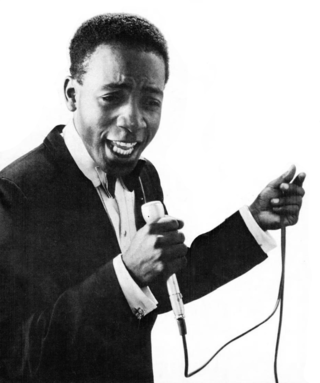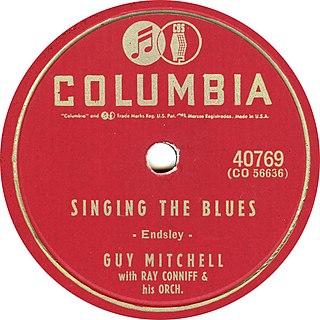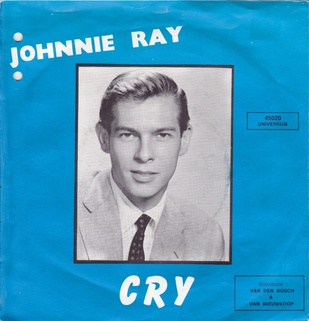
The Boomtown Rats are an Irish new wave band originally formed in Dublin in 1975. Between 1977 and 1985, they had a series of Irish and UK hits including "Like Clockwork", "Rat Trap", "I Don't Like Mondays" and "Banana Republic". The original line-up comprised six musicians; five from Dún Laoghaire in County Dublin; Gerry Cott, Simon Crowe (drums), Johnnie Fingers (keyboards), Bob Geldof (vocals) and Garry Roberts, plus Fingers' cousin Pete Briquette (bass). The Boomtown Rats broke up in 1986, but reformed in 2013, without Fingers or Cott. Garry Roberts died in 2022. The band's fame and notability have been overshadowed by the charity work of frontman Bob Geldof, a former journalist with the New Musical Express.

Robert Alvin Von Hebb was an American R&B and soul singer, musician, songwriter, recording artist, and performer known for his 1966 hit entitled "Sunny".
"Hey There" is a show tune from the musical play The Pajama Game, written by Richard Adler and Jerry Ross. It was published in 1954. It was introduced by John Raitt in the original production. In the show, Sid sings it to a recording device, telling himself that he's foolish to continue his advances to Babe. He plays the tape back, and after responding to his own comments, sings a duet with himself.
"Hernando's Hideaway" is a tango show tune, largely in long metre, from the musical The Pajama Game, written by Jerry Ross and Richard Adler and published in 1954. It was sung in the stage and film versions of the musical by Carol Haney. The song is about a fictional invitation-only nightclub of the same name where lovers can meet for secret rendezvous. In the few years after the song's release, a number of artists had hit recordings of it, including Archie Bleyer, Johnnie Ray and The Johnston Brothers.
"I Believe" is a popular song written by Ervin Drake, Irvin Abraham, Jack Mendelsohn and Al Stillman in 1953. The most popular version was recorded by Italian-American singer Frankie Laine, and spent eighteen weeks at No. 1 on the UK Singles Chart.
"Don't Let the Stars Get in Your Eyes" is a country song about a man away from home who is worried that his paramour may unwittingly stray from their relationship. It was written by Winston L. Moore and published in 1952. The song has been recorded in many different styles by many performers, with Perry Como's version hitting number 1 in both the US and UK.

"Singing the Blues" is a popular song composed by Melvin Endsley and published in 1956. The highest-charting version was by Guy Mitchell and the first recording of the song was by Marty Robbins. It is not related to the 1920 jazz song "Singin' the Blues" recorded by Frank Trumbauer and Bix Beiderbecke in 1927.

"Ruby Tuesday" is a song recorded by the Rolling Stones in 1966, released in January 1967. The song became the band's fourth number-one hit in the United States and reached number three in the United Kingdom as a double A-side with "Let's Spend the Night Together". The song was included in the American version of Between the Buttons.
"Butterfly" is a popular song written by Bernie Lowe and Kal Mann and published in 1957. The song is credited to Anthony September as songwriter in some sources. This was a pseudonym of Anthony Mammarella, producer of American Bandstand.

"I Can't Stop Loving You" is a popular song written and composed by country singer, songwriter, and musician Don Gibson, who first recorded it on December 3, 1957, for RCA Victor Records. It was released in 1958 as the B-side of "Oh, Lonesome Me", becoming a double-sided country hit single. At the time of Gibson's death in 2003, the song had been recorded by more than 700 artists, most notably by Ray Charles, whose recording reached No. 1 on the Billboard chart.

"Cry" is a 1951 popular song written by Churchill Kohlman. The song was first recorded by Ruth Casey on the Cadillac label. The biggest hit version was recorded in New York City by Johnnie Ray and The Four Lads on October 16, 1951. Singer Ronnie Dove also had a big hit with the song in 1966.

"Who's Sorry Now?" is a popular song with music written by Ted Snyder and lyrics by Bert Kalmar and Harry Ruby. It was published in 1923 as a waltz. Isham Jones had a hit recording in 1923 with the song arranged as a foxtrot. Later sheet music arrangements, such as the 1946 publication that was a tie-in to the film A Night in Casablanca, were published in 2
2 time. Other popular versions in 1923 were by Marion Harris, Original Memphis Five, Lewis James, and Irving Kaufman.

"I'll Get By (As Long as I Have You)" is a popular song with music by Fred E. Ahlert and lyrics by Roy Turk that was published in 1928. Versions by Nick Lucas, Aileen Stanley and, most successfully, Ruth Etting, all charted in America in 1929.
"Ain't Misbehavin'" is a 1929 stride jazz/early swing song. Andy Razaf wrote the lyrics to a score by Thomas "Fats" Waller and Harry Brooks for the Broadway musical comedy play Connie's Hot Chocolates.

Dee Clark was an American soul singer and songwriter best known for a string of R&B and pop hits in the late 1950s and early 1960s, including the song "Raindrops", which became a million-seller in the United States in 1961.

"Such a Night" is a popular song from 1953, written by Lincoln Chase and originally recorded by the Drifters. The Drifters featuring Clyde McPhatter recorded the song in November 1953, and Atlantic Records released it in January 1954 as the intended B-side of the McPhatter-penned "Lucille", which was recorded by an earlier version of the group. Despite being banned by some radio stations as too "racy", it reached number 2 on the US Hot R&B/Hip-Hop Songs Chart in 1954.
"The Story of My Life" is a song written by Burt Bacharach and Hal David. It was published in 1957. It was recorded by Marty Robbins and reached number one on Billboard's country chart in 1958, and it became a number one hit song for Michael Holliday in the UK.
"I'll Be Home" is a 1955 song that was written by Ferdinand Washington and songwriter, Stan Lewis.
"Yes Tonight Josephine" is a 1957 song written by Winfield Scott and Dorothy Goodman, and performed by Johnnie Ray. It was a hit single in both the US and UK.
"My Son, My Son" is a traditional popular music song written by Gordon Melville Rees, Bob Howard and Eddie Calvert in 1954. A recording of the song by Vera Lynn reached number one in the UK Singles Chart in November that year. It was Lynn's only UK number one hit on the official chart, a feat she achieved long after the period she became most associated with as the Forces' Sweetheart in World War II. However, there was no official singles sales chart in the UK at that time, so her recordings of songs which she has subsequently become more familiar with, such as her 1939 signature song, "We'll Meet Again", did not feature on any contemporary charts.









